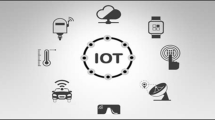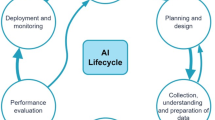Abstract
EDUCERE (Ubiquitous Detection Ecosystem to Care and Early Stimulation for Children with Developmental Disorders) is a government funded research and development project. EDUCERE objectives are to investigate, develop, and evaluate innovative solutions for society to detect changes in psychomotor development through the natural interaction of children with toys and everyday objects, and perform stimulation and early attention activities in real environments such as home and school. In the EDUCERE project, an ethical impact assessment is carried out linked to a minors’ data protection rights. Using a specific methodology, the project has achieved some promising results. These include use of a prototype of smart toys to detect development difficulties in children. In addition, privacy protection measures which take into account the security concerns of health data, have been proposed and applied. This latter security framework could be useful in other Internet of Things related projects. It consists of legal and technical measures. Special attention has been placed in the transformation of bulk data such as acceleration and jitter of toys into health data when patterns of atypical development are found. The article describes the different security profiles in which users are classified.

Similar content being viewed by others
Notes
The team members and collaborators come from the Technical University of Madrid (Universidad Politécnica de Madrid), Autonomous University of Madrid (Universidad Autónoma de Madrid), University of Alcalá (Universidad de Alcalá), Cardenal Cisneros University Center (Centro Universitario Cardenal Cisneros), and the State Reference Center for Individual Autonomy and Technical Support [Centro de Referencia Estatal de Autonomía Personal y Ayudas Técnicas, (CEAPAT)].
References
Aced, E. (2014). Evaluación de impacto en la privacidad [Privacy Impact Assessment]. Agencia Española de Protección de Datos [Spanish Agency for Data Protection]. http://www.agpd.es/portalwebAGPD/jornadas/6_sesion_anual/common/EAF_EVALUACIoN_IMPACTO_PRIVACIDAD.pdf. Accessed 5 Feb 2017.
Agencia Vasca de Protección de Datos. (2007). Reglamento de Desarrollo LOPD. Resumen de las medidas de Seguridad en el Reglamento RD-1720/2007. Resumen de las medidas de seguridad en el reglamento RD-1720/2007.
ARTICLE 29 DATA PROTECTION WORKING PARTY 0829/14/EN. 0829/14/EN WP216 Opinion 05/2014 on Anonymisation Techniques. Adopted on 10 April 2014.
Bieker, F.; Friedewald, M.; Hansen, M.; Obersteller, H. & Rost, M. (2016). A Process for Data Protection Impact Assessment under the European General Data Protection Regulation. In S. Schiffner, J. Serna, D.Ikonomou, & K. Rannenberg (Eds.) Privacy Technologies and Policy.In Proceedings of the 4th Annual Privacy Forum. Frankfurt/Main, Sept. 7–8, 2016 (pp 21–37).
Boenink, M., Swierstra, T., & Stemerding, D. (2010). Anticipating the interaction between technology and morality: A scenario study of experimenting with humans in bionanotechnology. Studies in Ethics, Law, and Technology, 4, 1–38. doi:10.2202/1941-6008.1098.
Brey, P. A. E. (2012). Anticipating ethical issues in emerging IT. Ethics and Information Technology, 14, 307–309.
Council on Children With Disabilities, Section on Developmental Behavioral Pediatrics, Bright Futures Steering Committee & Medical Home Initiatives for Children With Special Needs Project Advisory Committee. (2006). Identifying infants and young children with developmental disorders in the medical home: An algorithm for developmental surveillance and screening. Pediatrics, 118(1), 405–420.
Davara, M. A. (2013). El tratamiento de datos de carácter personal y la utilización de la tecnología: entre la ética y el derecho [Personal data processing and the use of technology: between Ethics and Law]. Diario La Ley. Año XXXIV. Num. 8157.
Department of Health (2013). The Early Intervention Program: A Parent’s Guide. http://www.health.ny.gov/publications/0532/.
Domingo, M. C. (2012). An overview of the internet of things for people with disabilities. Journal of Network and Computer Applications, 35, 584–596.
Fernández-Aller, C. (2012). Algunos retos de la protección de datos en la sociedad del conocimiento. Especial detenimiento en la computación en nube [Some challenges for data protection in the society of knowledge. A closer look to computation in the cloud]. RDUNED Revista de Derecho UNED, 10, 125–145.
Institute of Electrical and Electronics Engineers - IEEE (2017). Code of Ethics. http://www.ieee.org/about/corporate/governance/p7-8.html. Accessed 5 Feb 2017.
Johnson, D. (2001). Computer ethics. New York: Prentice Hall.
Martín-Ruiz, M. L.; Valero, M. A; Gómez, A. & Torcal, C. (2015). A Cooperative Decision Support System for Children’s Neurodevelopment Monitoring. In 2nd EAI International Conference of IoT Technologies for HealthCare. Rome, Italy. October 26–27, 2015.
Martín-Ruiz, M. L., Valero, M. A., Torcal, C., & Pau, I. (2014). Evaluating a Web-Based Clinical Decision Support System for Language Disorders Screening in a Nursery School. Journal of Medical Internet Research, 16(5), e139.
Murillo, P. L. (1992). La protección de los datos personales ante el uso de la Informática en el Derecho español [Personal data protection confronted to the use of Information Technologies in Spanish Law]. Estudios de Jurisprudencia COLEX, 3, Nov.dic 1992, p. 18.
Núnez-Nagy, S., Alarcos, B., Valero, M. A., Gallego, T., Ramírez, R. & Serrano, C. (2015). Smart toys for detecting children developmental delays. In International Conference on Recent Advances in Neurorehabilitation. Valencia (Spain). June 11–12, 2015.
Ortega, J.E., del Barrio, C., Núnez-Nagy S. & Malagón J. (2016). Evaluation of manual dexterity in early education. In Proceedings of the 17th European Conference on Developmental Psychology. Braga, Sept. 8–11, 2015 (pp. 63–67). Bolonia: Medimond.
Palm, E., & Hansson, S. O. (2006). The case for ethical technology assessment. Technological Forecasting and Social Change, 73, 543.
Paul, R., & Norbury, C. (2011). Language disorders from infancy through adolescence: Listening, speaking, reading, writing, and communicating (4th ed.). Amsterdam: Elsevier Health Sciences.
REAL DECRETO 1720/2007, de 21 de diciembre, por el que se aprueba el Reglamento de desarrollo de la Ley Orgánica 15/1999, de 13 de diciembre, de protección de datos de carácter personal [ROYAL DECREE1720/2007, 21st Dec, in order to aprove the regulation to develop the Fundamental Law 15/1999, 13 Dec, of Personal Data Protection]. BOE núm. 17, 19/01/2008. https://www.boe.es/buscar/act.php?id=BOE-A-2008-979. Accessed 5 Feb 2016.
Stahl, B. (2011). IT for a better future: How to integrate ethics, politics and innovation. Journal of Information, Communication and Ethics in Society, 9(3), 140–156. doi:10.1108/14779961111167630.
THE EUROPEAN PARLIAMENT AND THE COUNCIL OF THE EUROPEAN UNION. (2016). REGULATION (EU) 2016/679 OF THE EUROPEAN PARLIAMENT AND OF THE COUNCIL of 27 April 2016 on the protection of natural persons with regard to the processing of personal data and on the free movement of such data, and repealing Directive 95/46/EC (General Data Protection Regulation). Official Journal of the European Union. http://eur-lex.europa.eu/legal-content/EN/TXT/PDF/?uri=CELEX:32016R0679&from=ES. Accessed 5 Feb 2016.
Troncoso, A. (2010) La protección de datos personales. En busca del equilibrio [Personal data protection. Searching for balance]. Valencia: Tirant lo Blanch. p. 68.
Valero, M. A., Lindén, M., Velasco, J. R., & Björkman, M. (2015). Personalisation of intelligent homecare services adapted to children with motor impairments. Lecture Notes in Computer Science, 8867, 476–479.
World Health Organization & World Bank. (2011). World report on disability. Geneva. http://www.who.int/disabilities/world_report/2011/en/index.html. Accessed 5 Feb 2017.
Wright, D. (2011). A framework for the ethical impact assessment of information technology. Ethics and Information Technology, 13(3), 199–226.
Wright, D., Finn, R., & Rodrigues, R. (2013). A comparative analysis of privacy impact assessment in six countries. Journal of Contemporary European Research, 9(1), 160–180.
Acknowledgements
This article is part of a wider research conducted under the EDUCERE project framework (Ubiquitous Detection Ecosystem to Care and Early Stimulation for Children with Developmental Disorders;TIN2013-47803-C2-1-R), supported by the Ministry of Education and Science of Spain through the National Plan for R + D + I (research, development, and innovation). The authors wish to thank Dr. R. Corripio-Gil, for her useful comments on an earlier draft.
Author information
Authors and Affiliations
Corresponding author
Appendices
Appendix 1
Letter addressed to parents or legal tutors of children attending one of the early education schools (0–3 year’s old children), introducing the project and asking for their consent for their children’s participation.

Dear parents/tutors:
We form a team of engineers, psychologists, and physiotherapists from the Universidad Politécnica de Madrid (UPM), Universidad Autónoma de Madrid (UAM) and Universidad de Alcalá (UAH), who are developing the project EDUCERE [(Ecosistema de Detección Ubicua, atenCión y Estimulación tempRana para niños con trastornos del dEsarrollo) Ecosystem for the Ubiquitous Detection, AtenTion and Early Estimulation of children with developmental difficulties], coordinated by Miguel Ángel Valero (UPM). The Project involves several early education schools in Madrid city and surrounding towns, and aims at exploring various aspects of early development through the child’s natural interaction with people and with toys and other daily objects. More specifically, the possibilities of a set of digitalized toys to give information of children’s actions will be explored. The toys are equipped with the necessary technology to record diverse elements of children’s actions. The final aim is to detect possible difficulties otherwise unobservable, in order to promote early stimulation and intervention to prevent from more severe difficulties later in children’s lifes.
The project started in autumn 2014. In this first study children aged 20–30 months, will take part in an object-manipulation task, lasting 15 min. as average, interviewed in a ludic framework by researchers with experience in interviewing and interacting with children. The interview will take place during school time, in the moment decided by the school in order not to disrupt the normal schedule of activities, rest and meals.
Approaching the end of the academic year, the school will have the results, and the team can present them in a joint or individual session to those families interested in knowing their children’s data.
According the Data Protection Rules, and the Commissions for Ethics in Research of the corresponding universities taking part in the Project, you can find attached a document of parental consent. Please return it with your signature in case you agree on your child’s participation. The document is supervised by a Ph.D. in Law, lecturing at UPM who is an expert in data protection.
Moreover, aiming exclusively at analysing their task performance, children might be videotaped manipulating the toys. In these videos, children’s faces will not be. This material would only be used for didactic purposes in the context of scientific divulgation. The participants’ names will be kept anonymous. Nevertheless your explicit consent is also required, therefore we ask you again to sign your agreement on this.
At the school principal’s office, you will find a document with a more detailed description of the Project, at the disposal of any parent wishing information in depth. Please contact us in case you would like further clarification, or you have any doubt. You find below our telephone numbers and email addresses.
Kind regards.
-
Cristina del Barrio, 91 497 5212, cristina.delbarrio@uam.es
-
Kevin van der Meulen, 91 497 2384, kevin.vandermeulen@uam.es
Departamento de Psicología Evolutiva y de la Educación, Grupo de investigación INEXE (Inclusión-exclusión educativa) [Dept. of Developmental & Educational Psychology, Research Group INEX (Inclusion–exclusion in educational settings)]
-
José Eugenio Ortega, 91 497 4597, eugenio.ortega@uam.es
Dpto. de Psicología Clínica y de la Salud [Dept. Of Clinical & Health Psychology]
-
Ángeles Gutiérrez, 91 497 6603, nines.gutierrez@uam.es
Dpto. Didáctica y Teoría de la Educación [Dept. o Didactics & Theory of Education]
UNIVERSIDAD AUTÓNOMA DE MADRID
Appendix 2
Document of Informed Parental Consent

Rights and permissions
About this article
Cite this article
Martín-Ruíz, M.L., Fernández-Aller, C., Portillo, E. et al. Developing a System for Processing Health Data of Children Using Digitalized Toys: Ethical and Privacy Concerns for the Internet of Things Paradigm. Sci Eng Ethics 24, 1057–1076 (2018). https://doi.org/10.1007/s11948-017-9951-x
Received:
Accepted:
Published:
Issue Date:
DOI: https://doi.org/10.1007/s11948-017-9951-x




